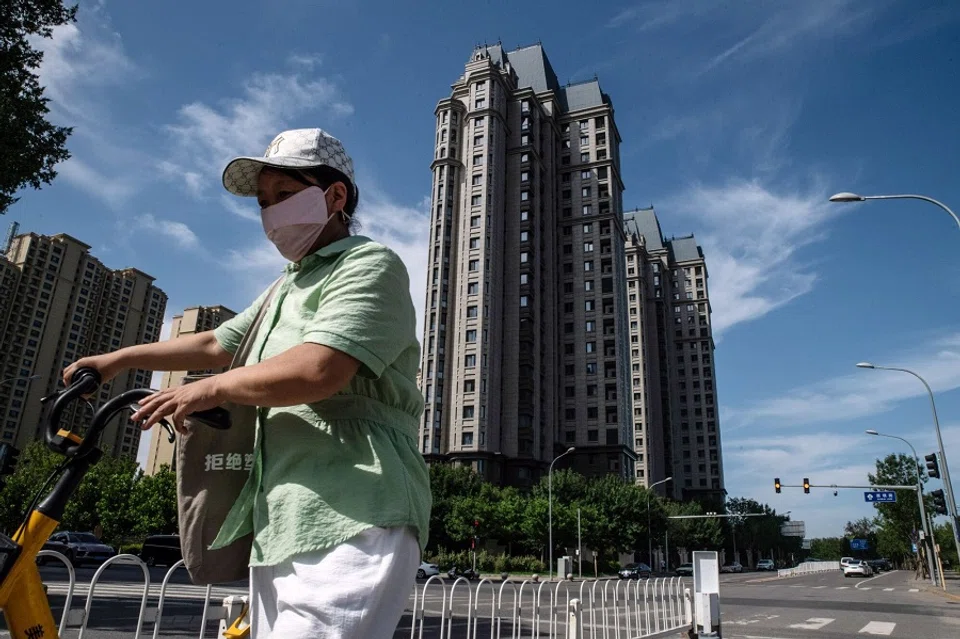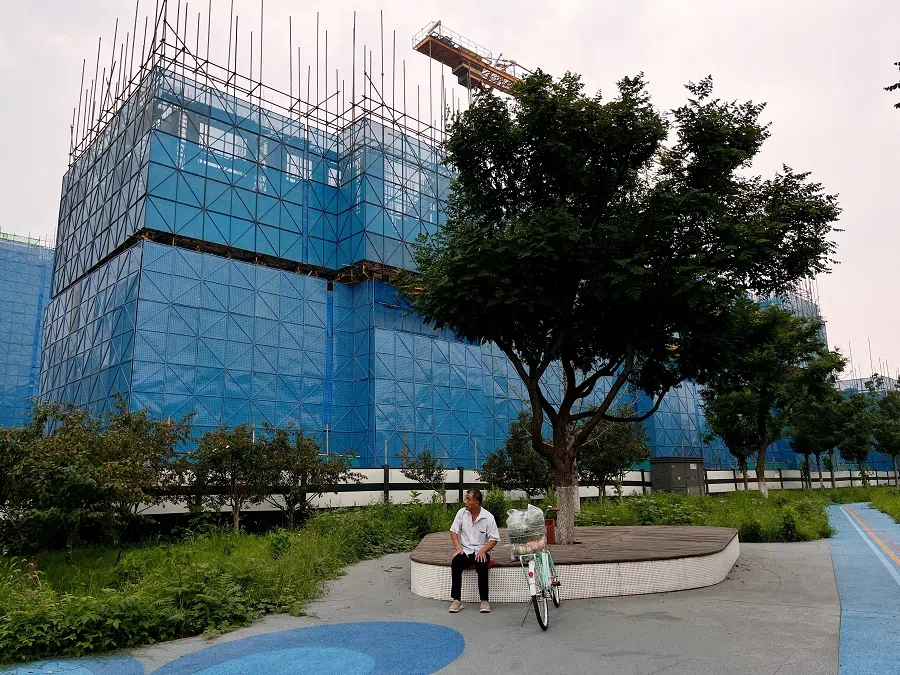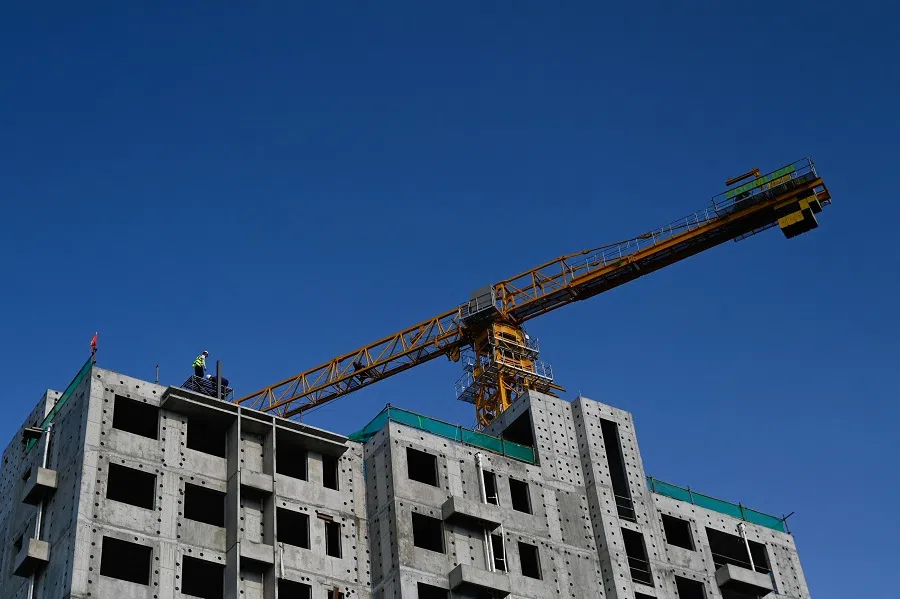The dangerous link between China's real estate demise, the economy and the financial system
With Chinese property giant Evergrande filing for bankruptcy in the US and other companies like Country Garden tottering on the brink, China's property sector is plunging further into a crisis that could have major ramifications on the country's real economy and financial sector. Economist Alicia García Herrero explains.

Bursting real estate bubbles never come alone. This is the experience of the US with the sub-prime crisis in 2007, but also that of Spain and the UK slightly later. Japan also had to pay a very high cost from the bursting of its real estate bubble in the early 1990s but in a much more protracted way.
China's situation is clearly more similar to that of Japan, because like Japan, China is an external creditor. This means that the real estate sector did not expand by borrowing from overseas, but was financed by domestic savings. In that regard, the risk of a "sudden stop" in a risk-off environment is very limited unless Chinese households decide to sell off Chinese assets. This is even harder in China than in Japan due to capital controls, and this did not even happen in Japan, so the risk of a balance of payments crisis in China is very low.
Excess capacity and decelerating prices in real estate
For China, the only way out of this crisis is a slow but painful adjustment both via quantities and prices. The process has already started with fixed asset investment in real estate growing negatively at double digits due to bleak prospects for housing prices which impinge on the demand for housing. Secondly, the price channel is also working rapidly with producer prices falling around 5% a year. This whole price deflation is starting to transmit to consumer prices with negative growth for the first time in July (-0.3%).
The question then is whether Chinese policy makers can stave off the pain linked to absorbing the excess capacity in the real estate sector in any way.

The question then is whether Chinese policy makers can stave off the pain linked to absorbing the excess capacity in the real estate sector in any way. The most obvious way is to lift the regulatory constraints that were introduced in the summer of 2020 to limit the leverage by real estate developers, the so-called "three red lines".
The lifting of such regulatory constraints is well under way with a recent extension of the temporary lifting of the three red lines, but nothing has changed. The reason is that such constraints are no longer binding as the demand for housing has fallen so steeply that real estate developers are not willing to invest to build more, which also means that they do not need to leverage independently on the now temporarily lifted regulatory constraints.
While the ongoing double-digit fall in fixed asset investment in real estate is necessary to reduce the supply of housing in the future, it is still not enough to fully absorb the excess capacity in this sector. This also means that the adjustment has only started and will take years to conclude.
For this vicious circle to stop, Chinese policy makers need to focus on what is reversible - namely the negative sentiment around China's real estate sector - but without trying to go against the trend, which no doubt is one of decelerating prices. In fact, China's population is falling and the average household size is already extremely low so it cannot come down any further. China is also not open to immigration to mitigate the demographic challenges.
Spillover effects on shadow banking
Moving from the unavoidable long-term consequences to the immediate ones, the risk of spillovers from failing real estate developers to the financial system appears as the most important one. This question is particularly valid today after Evergrande - the largest real estate developer in China in terms of outstanding liabilities - just filed for bankruptcy in the US to protect its assets in the light of a massive restructuring of its debt after it missed payments in June 2021.

As if this were not enough, only a couple of days before, Country Garden, China's largest real estate developer in terms of assets, announced that it would not pay interest on two international bonds. Country Garden was considered the darling of real estate developers when Evergrande defaulted on its debt back in late 2021, as it has a much better-managed balance sheet. So the rapid worsening of Country Garden's profitability - having posted large losses recently - is a sign of how systemic real estate problems are in China.
The dangerous link between the demise of China's real estate sector and shadow banking has become painfully apparent...
Systemic problems can generate systemic consequences, beyond lowering growth and deflation which are already bad enough. The additional channel of transmission is, no doubt, the financial system, given that real estate developers fund their operations through bond issuance and, to a lesser extent, band loans but also through shadow banking, in particular wealth management products (WMPs). The latter has become more prevalent recently, as the most important source of funding for developers is pre-sales, which have plummeted as households are much more wary of buying first-hand housing after the many unfinished units due to developers' defaults.
The dangerous link between the demise of China's real estate sector and shadow banking has become painfully apparent as Zhongrong Trust, a large asset management company with the equivalent of US$87 billion under management, missed payments on its WMPs to retail investors. This has generated additional worries about the impact of the bursting of the real estate bubble, not only on the real economy but also on the financial sector.

Financial stability is, thus, an additional point of attention for Chinese policy makers trying to navigate the adjustment of the Chinese economy to a shrinking real estate sector.
Measures to ensure financial stability
As opposed to lower growth and deflationary pressures, risks to financial stability operate much faster and with wide ramifications, many of which are hard to control. For this reason, it would seem important that China's newly created regulatory authority - with much wider powers - has a plan ready to intervene in the system if deposit runs or other forms of mistrust in the banking system were to occur. This could also apply to other parts of the financial system where direct intervention by lender of last resort is more difficult, particularly in shadow banking
Chinese policy makers should focus on limiting potential spillovers into the financial sector and thereby systemic risk. The longer they wait to do so, the bigger the cost will be.
All in all, while the structural consequences of a disinflating real estate bubble cannot be avoided (lower growth and deflationary pressures), Chinese policy makers should focus on limiting potential spillovers into the financial sector and thereby systemic risk. The longer they wait to do so, the bigger the cost will be.
Related: China's property crisis contagion spreads to state-backed developers | China's housing downturn: Household registration reform needed | Chinese local governments facing debt crisis: Waiting for bailouts | China's property companies going bust may be a common sight in 2023 | China lines up yet more aid for the property sector, but will it be enough?



![[Big read] When the Arctic opens, what happens to Singapore?](https://cassette.sphdigital.com.sg/image/thinkchina/da65edebca34645c711c55e83e9877109b3c53847ebb1305573974651df1d13a)
![[Video] George Yeo: America’s deep pain — and why China won’t colonise](https://cassette.sphdigital.com.sg/image/thinkchina/15083e45d96c12390bdea6af2daf19fd9fcd875aa44a0f92796f34e3dad561cc)
